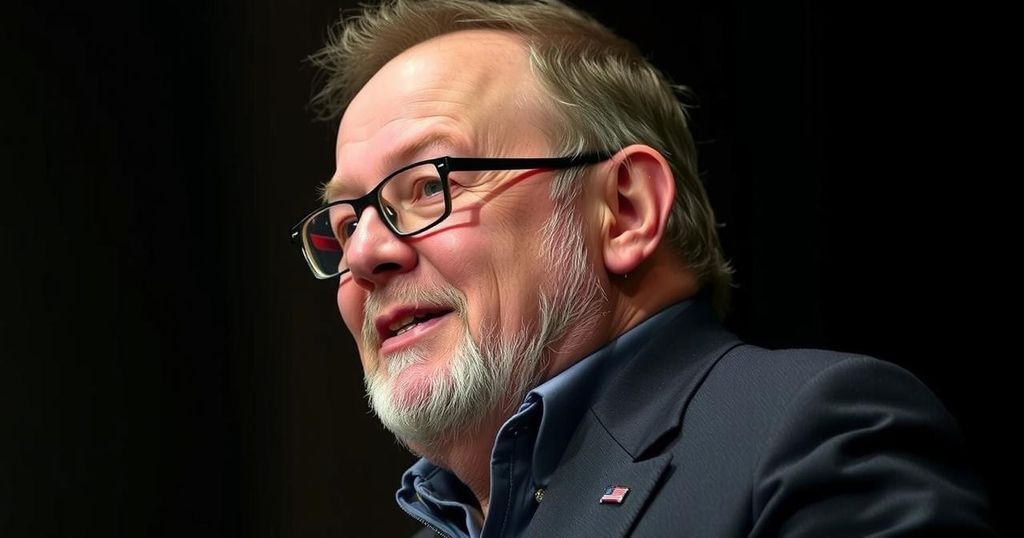Tim Walz Returns to Minnesota Following Election Defeat
Tim Walz returned to Minnesota after losing his election bid as Vice President Kamala Harris’s running mate. His time on the national stage was marked by both successes and notable gaffes, as he attempted to appeal to moderate voters. As he resumes his governorship amid shifting political dynamics in Minnesota, his party’s future influence remains uncertain after the election results.
Tim Walz’s brief tenure on the national political scene concluded in an unexpected manner following his defeat alongside Vice President Kamala Harris in the most recent election. Addressing the Walz family in her concession speech, Vice President Harris remarked, “To Governor Walz and the Walz family: I know your service to our nation will continue.” Emotions were palpable as Governor Walz acknowledged the moment with gratitude, yet soon he will transition back to his gubernatorial responsibilities in St. Paul, where he remains in office for another two years despite facing shifting political dynamics favoring Republicans in the state. The past three months have seen Walz experience both triumphs and setbacks since being nominated as Harris’s running mate. His campaign was marked by significant moments such as delivering a keynote address at the Democratic National Convention and collaborating with prominent figures like former President Barack Obama and musician Jon Bon Jovi. Conversely, he did face notable missteps during his campaign, including comments regarding friendships with school shooters and exaggerations relating to his travels in China. These incidents highlighted his struggle to balance his liberal record with an appeal to moderate and working-class voters across the Midwest. Harris had a strategic vision for Walz, intending to leverage his background as a veteran and union member while advocating among key demographics such as farmers and educators. Creative in his approach, Walz sought to embody a genial presence in contrast to typical attack-dog candidates. However, Harris’s decision to select Walz over other prominent contenders, who were believed to be essential for winning critical battleground states, drew skepticism from some political analysts. This choice, ultimately overshadowed by losses in pivotal states like Pennsylvania and Arizona, underscores the impact of candidate selection on electoral outcomes. Despite remaining somewhat unknown nationally, Walz had gained recognition for his distinct brand of progressive masculinity and a relatable demeanor. While his favorability exceeded that of more recognizable candidates during the campaign, his singular debate performance raised concerns about his effectiveness when juxtaposed with more seasoned opponents. Looking ahead, Walz’s gubernatorial term extends until 2027, yet uncertainties loom regarding his potential pursuit of a third term amidst contrasting party control dynamics in the Minnesota legislature. Significantly, Lieutenant Governor Peggy Flanagan captured national attention during the campaign, anticipating her path to history as the first Indigenous woman to serve as governor had Walz emerged victorious.
The article discusses Governor Tim Walz’s return to Minnesota following an unsuccessful run alongside Vice President Kamala Harris in the recent election. It highlights Walz’s brief involvement on the national political stage, the challenges he faced during the campaign, and the implications for his gubernatorial role in Minnesota as the state experiences a political shift. The article also reflects on his previous accomplishments and future uncertainties within the state’s Democratic landscape as the election results continue to emerge.
In summary, Tim Walz’s brief foray into national politics concluded with his election loss, which mandates his return to gubernatorial duties in Minnesota. Despite a mix of accomplishments and challenges during the campaign, the shifting political landscape may affect his party’s power and his future ambitions. As he grapples with these dynamics, the role of local and national political strategies will remain crucial to his leadership moving forward.
Original Source: www.usatoday.com




Post Comment